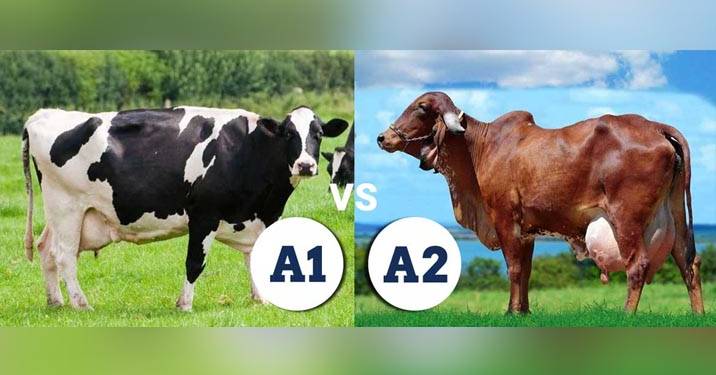Which milk are you drinking?

For millennia, Hindus have maintained a holy relationship with Cows (Bos Indicus). The Desi breed of cows was given utmost importance among the animals, given its multi-dimensional usefulness. A few years ago, a scientist in New Zealand started making a distinction between two types of milk- A1 and A2. His primary argument was that while A1 milk is harmful to health and causes many diseases, A2 milk has better nutrients and therefore it is beneficial to human health.
In 2018, A1 and A2 became one of Googled keyword in New Zealand and Australia. India came at a distant third in terms of interest in types of milk. According to Corran McLachlan, a New Zealand-based scientist and entrepreneur, who founded A2 Corporation, ‘prominence of A1 beta-casein over A2 could be a public health issue, leading to type 1 diabetes, autism, an increased risk of heart disease, and digestive issues.’
“Demand has been particularly strong in Australia, but also through the cross border e-commerce (CBEC) channel into China,” said A2 Milk Corporation.
Dr N Murali, Head, Department of Animal Genetics and Breeding at the Veterinary College and Research Institute in Namakkal stated that breeds of Indian desi cows- Tharparkar, Gir, and Sahiwal, have a high yield of A2 type milk.
“All indigenous breeds, or Bos Indicus, have a higher frequency of A2 protein,” said Dr Murali. The cross-breeding of Indian cows with foreign breeds like Jersey and Holstein Friesian (which produce more milk, but rich in A2 protein) is muddling the gene pool of Indian cows and destroying their ‘racial purity’.
It is important to note that Indian cows’ as well as Indian buffalos’ milk is rich in A2 protein although Cow’s milk is interchangeably used for A2 milk in popular media.
The Indian government agreed to take initiatives to differentiate between A1 and A2 variety. The Food Safety and Standards Authority of India (FSSAI) is yet to certify different varieties and as of now, Tamil Nadu Veterinary and Animal Sciences University is the only agency which certifies animal on milk variety differentiation. Most of the Indian cows produce A2 type of milk the government and the Indian government should have taken advantages of this by exporting A2 certified packaged milk.
The breed of Indian cows needs to be protected, their milk must be patented, and the Food Safety and Standards Authority of India need to differentiate and certify A2 milk. This way, civilisation heritage can be conserved and could be exploited for commercial benefits.
